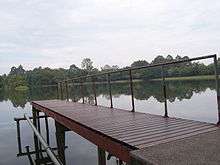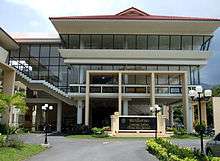Chiang Mai University
| มหาวิทยาลัยเชียงใหม่ | |
 | |
| Motto |
"Attānaṃ Damayanti Paṇḍitā" (Pāḷi) ("The wise control themselves") |
|---|---|
| Type | Public (National) research university |
| Established | 1964[1] |
| President | Associate Professor Niwes Nantachit, M.D. |
Administrative staff | 2,171 (2007)[2] |
| Students | 35,979 (Update 7 May 2015)[3] |
| Location |
Chiang Mai, Chiang Mai, Chiang Mai, Thailand 18°48′09″N 98°57′06″E / 18.802587°N 98.951556°ECoordinates: 18°48′09″N 98°57′06″E / 18.802587°N 98.951556°E |
| Colors | Purple |
| Affiliations | ASAIHL |
| Website | www.cmu.ac.th |
Chiang Mai University (CMU) (Thai: มหาวิทยาลัยเชียงใหม่) is a public research university in northern Thailand founded in 1964.[1] It has a strong emphasis on engineering, science, agriculture, and medicine. Its instructional mission includes undergraduate, graduate, professional and continuing education offered through resident instruction. Its main campus lies between Chiang Mai downtown and Doi Suthep in Chiang Mai, Chiang Mai Province.
The university was the first institution of higher education in northern Thailand, and the first provincial university in Thailand.
Campuses

Chiang Mai University has four campuses, three of them in Chiang Mai and one in Lamphun, which together cover about 3,490 acres (14.1 km2).[4] There are 18 housing complexes located on campus for students attending the university. Seventeen of them are on the main campus and one is on the Mae Hea campus[5]
Suan Sak Campus (main campus)
The main university campus, known as Suan Sak campus (Thai: สวนสัก) or Cherng Doi (Thai: เชิงดอย), lies about five kilometres west of the city center. Set against Doi Suthep, the campus occupies a 725-acre (2.93 km2) site, bounded on three sides by main shopping streets and on the fourth by the Chiang Mai Zoo. The campus includes the university's administrative centre, the science, engineering, humanities, and social science faculties, political science and public administration, law, the graduate school, all of the campus resource facilities and services and major sports facilities. An attractive feature of this campus is the Ang Kaew Reservoir. Constructed to supply water for the university, it is also a recreational area for campus residents and the local community. In the 1960s, the area was still forested. With conservation in mind, university buildings were constructed between the trees, with the result that the campus still retains much of its original setting.
Suan Dok campus
Near the main campus, and closer to the city, the health sciences complex, the Suan Dok campus (Thai: สวนดอก), occupies a 110-acre (0.45 km2) site which includes faculties of medicine, associated medical sciences, nursing, dentistry, pharmacy, and Maharaj Nakorn Chiang Mai Hospital, known locally as Suan Dok, the largest teaching hospital in northern Thailand.
Mae Hea campus
About 5 km south of the main campus, the 864-acre (3.50 km2) Mae Hea campus (Thai: แม่เหียะ) is home to the faculties of veterinary medicine and agro-industry. The Energy Research and Development Institute (ERDI), the university center for renewable energy (mainly biogas and biomass), and energy efficiency improvement center, moved from the main campus to the Mae Hea campus in January 2009. This center is a national "biogas center of excellence", emphasizing biogas activities, especially biogas on swine farms.
Si Bua Ban campus
The university's latest acquisition is the Si Bua Ban campus (Thai: ศรีบัวบาน) in Amphoe Mueang Lamphun, Lamphun Province, about 55 kilometres south of Chiang Mai, on a 1,890-acre (7.6 km2) site close to the Lamphun industrial centre.
Academics
Chiang Mai University is a large, highly residential, research university, with a majority of enrollment coming from graduate and professional students.
Faculty

There are 20 faculties and one college in three disciplines.[6]
|
|
|
Rankings
Chiang Mai University ranks third in academics and fifth in research according to the Thailand Office of the Higher Education Commission[7] The international ranks are 67 in Asia (Quacquarelli Symonds, 2011[8])
Research institutes
- Energy Research and Development Institute-Nakornping (ERDI)
- Research Institute for Health Sciences (RIHES)
- Social Research Institute (SRI)
Non-university schools
- Language Institute (LICMU)
- Chiang Mai University Demonstration School (K-12)
Alumni and notable people
Alumni
- Yingluck Shinawatra, 28th Prime Minister of Thailand
- Chaturon Chaisang, Deputy Prime Minister from 2002–06
- Suthep Thaugsuban, Deputy Prime Minister from 2008–11
- Kasem Wattanachai, Privy Councilor from 2001–Present
- Apirak Kosayothin, 14th Governor of Bangkok
- Sompop Jantraka, Activist
- Suporn Watanyusakul, Reconstructive surgeon
Lecturers
- Minfong Ho, writer
- Roger A. Beaver, biologist
- Conrad H. Bergo, chemist
- Phisit Seesuriyachan, Biotechnologist
References
- 1 2 About CMU; Our Foundation
- ↑ http://www.mua.go.th/infodata/50/teacher50.xls (Thai)
- ↑ "Archived copy". Archived from the original on 2012-08-10. Retrieved 2013-03-04. (Thai)
- ↑ Our Campuses - Chiang Mai University Archived May 17, 2011, at the Wayback Machine.
- ↑ Chiang Mai University Housings
- ↑ Academics - Chiang Mai University Archived January 8, 2011, at the Wayback Machine.
- ↑ เปิด 50 อันดับมหาวิทยาลัยไทย Archived May 18, 2008, at the Wayback Machine.
- ↑ 2011 Asian University Rankings
External links
| Wikimedia Commons has media related to Chiang Mai University. |
- Chiang Mai University Official website (English)
Student Hangout